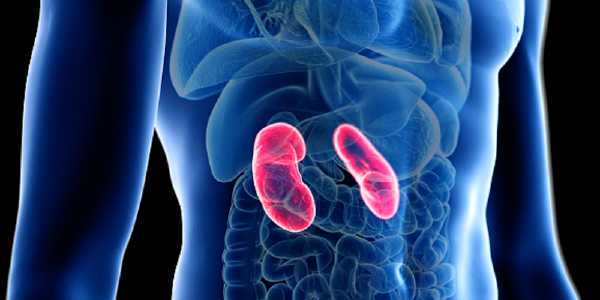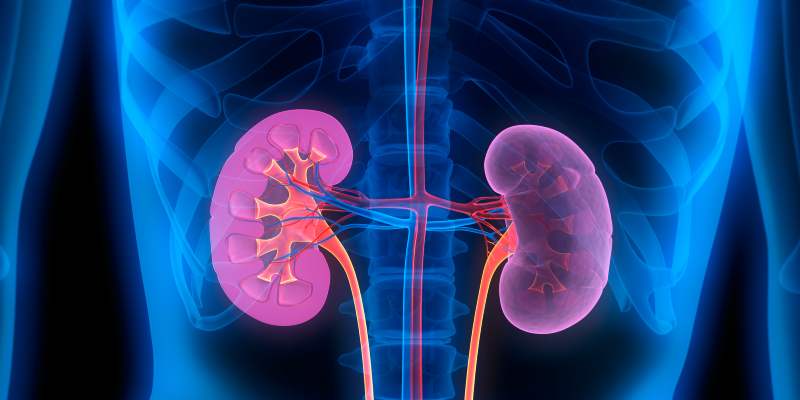The kidneys do a remarkable job every day: they tirelessly filter toxins from the body, regulate the water-electrolyte balance and produce vital hormones. The two excretory organs, each weighing just 150 grams, function primarily on lifestyle and diet. We outline how to improve kidney function, which foods help your kidneys and which ones harm them.
How to improve kidney function: overview

The organ, about the size of a fist, has the outer shape of two beans. The kidneys take on numerous other important functions in addition to detoxification. For example, they form urine and divert it through the urinary tract, regulate the acid-base balance and control the formation of red blood cells. Around 1500 liters of blood flows through healthy kidneys every day, which they cleanse in the process.
However, if the kidneys are damaged, they can no longer perform their tasks or only to a limited extent. Particularly deceptive: when kidney damage is recognized, it is usually too late, because it is usually symptom-free in the early stages. However, if complaints arise, these are often diffuse and are not always immediately assigned to the detoxification organ by those affected.
How common is chronic kidney failure?
An estimated ten percent of the population suffer from chronic kidney failure. The tricky thing: three quarters of those affected in the early stages do not know anything about it.
Due to the mostly symptom-free course in the early stages, there are few reliable data on the frequency of chronic kidney failure. A USA study suspects that around one in ten adults suffers from kidney failure in one of the five stages. More recent studies even assume that almost 15 percent of US adults are affected. It is particularly dangerous that, even with severe kidney failure, two out of five patients probably do not know anything about their disease.
If kidney damage at an earlier stage is also included, the number of unsuspecting people in the USA increases to 90 percent. The researchers also assume that around three quarters of those affected are unaware of their disease in these stages.
A restriction in kidney functions thus usually remains undetected and therefore also untreated. The reason for this is that the symptoms only develop slowly. However, there are some warnings that risk groups in particular should pay attention to.
Signs and course of kidney failure
With age, kidneys naturally weaken. Symptoms that can indicate kidney problems include:
- High blood pressure
- Sharp headache
- Water bloating and swelling in the legs
- Skin that tightens
- Foam in the urine
The following symptoms may occur in end-stage renal failure:
- high blood pressure that can no longer be adjusted
- decrease in the amount of urine
- water retention (edema)
- shortness of breath
- nausea
- vomiting
- loss of appetite
- irregular heartbeat
- drowsiness
- sleepiness
- cramps
If left untreated, chronic kidney failure can be fatal. Kidney disease has been linked to heart attacks, strokes and, according to a new study, even dementia. Before this happens, however, patients go through several stages that are usually symptom-free, especially at the beginning.
Chronic kidney failure can be measured with the help of the so-called creatinine clearance. This procedure for assessing kidney function determines the glomerular filtration rate, or GFR for short – i.e. the filter performance of the kidneys. In a healthy person, the GFR is 95 to 110 milliliters per minute. This means that the kidneys clean 95 to 110 milliliters of blood within this period. The GFR decreases as the disease progresses. Experts differentiate between five stages.
The 5 stages of renal failure
Stage 1 (GFR over 90 milliliters per minute) and Stage 2 (GFR 60 to 89 milliliters per minute):In the early stages, chronic kidney failure usually does not cause any noticeable symptoms. However, there are some warnings. For example, affected people should be suspicious of discolored or foamy urine. The latter is caused by increased protein excretion.
Water retention can also indicate the onset of the disease. If there is any suspicion, it is advisable to see a doctor as early as possible. As a rule, no changes can be detected directly in the blood during the first and second stages, but creatinine clearance or an ultrasound can already provide information. If the kidney failure is treated quickly, this increases the chances of slowing its progression.
Stage 3 (GFR 30 to 59 milliliters per minute): In the third stage, kidney performance is only half that of a healthy person. Symptoms such as fatigue, high blood pressure and a decrease in physical performance are now expressed. An American study2 showed that at this stage the risk of acute kidney failure also increases. In addition to the kidney failure itself, any accompanying complications (such as cardiovascular problems) must be treated. It is also essential to adjust the dose of certain medications.
Stage 4 (GFR 15 to 29 milliliters per minute): In the fourth stage, chronic kidney failure is already well advanced. Many patients now complain of loss of appetite, nausea and vomiting. Bone pain or itching on the skin are also characteristic. Existing water retention increases even more.
Stage 5 (GFR below 15 milliliters per minute): The fifth stage describes what is known as terminal kidney failure, i.e. the end stage of the disease. The function of the organ is now so poor that it can lead to complete kidney failure. Therefore, end-stage patients are dependent on dialysis or a kidney transplant.
Which groups are particularly at risk?
The causes of chronic kidney failure cannot always be clearly identified. The main risk factors are diabetes and high blood pressure. Previous kidney infections, congenital cystic kidneys (cysts on the kidneys) or the careless use of painkillers can also trigger kidney weakness.
How can you prevent kidney failure?
In order to prevent kidney weakness, it is particularly important to exercise caution when handling medication. Even supposedly harmless headache pills can damage the kidneys if used continuously. It is important to avoid foods such as sugar, unhealthy fats, salt and alcohol as much as possible.
Protein, which is so popular among athletes, can also irritate the kidneys – but more protein has no effect on muscle building , as a study found. The Nutrition Society therefore recommends not to exceed a daily protein intake of 0.8 grams per kilogram of body weight. Warning: These recommendations only relate to prevention. For dialysis patients, the guidelines can sometimes even be reversed.
How to improve kidney function: Which foods to avoid
Bad diet, pollutants and drug residues put a strain on the kidneys. Time to give the filter organs a week to regenerate. When it comes to detoxification and relief, many think first of the liver. That is surely correct. However, it is often overlooked that our kidneys also do amazing things in terms of disposing of harmful substances and that they are vital. They clean over 1000 liters of blood per day using tiny filters, the so-called nephrons.
In doing so, they filter out urea, phosphates, toxins and residues from drugs, form urine and flush the pollutants out of the body. However, the filter organs of around eight million Germans are constantly overloaded, and kidney function is already disturbed. The main cause is our lifestyle with poor nutrition, the resulting obesity, high blood pressure and diabetes.
Salt, fat, sugar, sweeteners such as aspartame, meat and alcohol are considered true “kidney killers” and should of course only be consumed in moderation. But there are also some healthy foods such as rhubarb, spinach, amaranth or Swiss chard that people with chronic kidney disease or decreased kidney function should severely restrict. They contain large amounts of oxalic acid, from which the metabolite oxalate is formed in the body. This has to be excreted via the intestines and kidneys, which usually no longer works smoothly at some point under constant stress. The possible consequences: kidney stones, kidney failure up to uremia (urine poisoning). Vegetarians should also be careful with foods containing oxalic acid, as the substance inhibits iron absorption.
The ingredients that are particularly important to avoid are:
Table salt: The kidneys need to wash excess salt out of the blood. Too much salt in the food, i.e. more than the daily recommendation of six grams, overwhelms the filter organs. Especially in fast food and ready meals, but also sausage and cheese, there is a lot of salt.
Phosphate: The mineral serves as a stabilizer and thickener and is added to many foods under the E numbers 338 to 341, 343, 459 to 325. Sausage in particular, but also cola and processed cheese, contain phosphate. It loads the kidneys and supports the calcification of the vessels.
Protein of animal origin , especially meat: If the kidney function is already somewhat restricted, too much protein can put additional stress on you. As a guideline, the following applies: no more than 1.5 grams of protein per kilogram of body weight;
Purines: Offal, meat and sausage contain, among other things, purines, which are metabolized into uric acid in the body. Uric acid has to be filtered out by the kidneys and excreted in the urine. However, the kidneys cannot cope with an oversupply of uric acid. The uric acid crystallizes out, these crystals can collect in the kidneys and form kidney stones. Incidentally, an increased uric acid level and too much animal protein are among other things responsible for an imbalance of acids and bases in the body. Acidification occurs and this also puts a strain on the kidneys.
How to improve kidney function: The 10 crucial rules
- Avoid sausage and red meat.
- No fast food, no ready meals, please prepare everything yourself as much as possible – then you will know what’s in it.
- Eat lots of fresh vegetables and fruits.
- Pay attention to fiber every day, not only whole grain bread, but also psyllium husks or flaxseed.
- Only season very sparingly with salt, preferably with fresh herbs.
- Refrain from alcohol and coffee.
- Reduce fat and sugar as much as possible.
- Drink around two liters of water a day. More is not good for kidney function, unless you sweat a lot, then you should of course drink more to compensate for the loss of fluid. Important: Not in a few large portions, but a small glass every now and then throughout the day. This cleanses the kidneys particularly well.
- Freshly squeezed lemon juice is deacidified (has an alkaline effect in the body due to its minerals) and can protect against kidney stones, as studies show. Drinking the juice of a lemon every day is therefore considered a prevention for the kidneys, but also generally for detoxification.
- Also important: Set your kidney week as stress-free as possible, ensure relaxation. Stress is an often underestimated “enemy” of the kidneys.
How to improve kidney function with the right food
- Lemon juice
At least two liters of water a day is known to be the best medicine for how to help your kidney. The fluid flushes the organs properly and thus ensures healthy function. 100 milliliters of freshly squeezed lemon juice (preferably made from organic lemons) not only go one better in terms of freshness, the citrates it contains are also proven to prevent kidney stones. According to a scientific publication by the Korean Urological Association, said citrates bind excess calcium, which in turn prevents painful crystal formation in the kidneys. A pleasant side effect for the immune system: the extra portion of vitamin C.
- Apples
The all-rounder fruit apple also turned out to be a real “kidney stone shock” in numerous studies. So effectively that the “American Society of Nephrology” (nephrology is a medical field that deals with the prevention, diagnosis and therapy of kidney diseases) published one of their specialist articles with “An apple a day keeps the kidney stones away”.
The authors refer to an 18-year study that revealed that those participants who consumed fresh fruit and vegetables every day (while largely avoiding salt and red meat) developed kidney stones up to 45 percent less often than the junk food-loving comparison group. The pectin contained in apples proved to be particularly effective as a amethod for how to strengthen the kidney. The valuable plant fiber keeps the kidney function busy, especially through its cholesterol-lowering and blood sugar-regulating effect.
- Buckwheat
In Russia buckwheat is one of the most important staple foods, but in this country the nutty-tasting and gluten-free grain is more of a niche existence. Buckwheat is not only a delicious source of protein, iron, B vitamins, magnesium and zinc – the so-called pseudo-grain apparently also has the property of measurably improving the function of already damaged kidneys.
Evidence for this is provided by a study from China carried out on rats suffering from diabetes. Buckwheat extract was regularly administered to the kidney-damaged animals, with the result that their detoxification organs recovered significantly. It is still unclear whether this knowledge can be transferred to humans. However, among other things he National Kidney Foundation also recommends to put buckwheat on the menu on a regular basis.
- Ginger
Ginger is already one of the most remarkable foods in terms of healing properties. Whether for nausea, sore throat, bloating, menstrual pain or much more – a little ginger promises quick relief for a wide variety of ailments. When it comes to the connection between ginger and kidney health, researchers are also getting more and more on the trail.
Above all, the antioxidants contained in the tuber are said to work wonders. A study from 2014 , for example , in which rats again had to serve, revealed the anti-inflammatory and thus protective effects of ginger extract on kidney damage caused by fructose. In the opinion of the scientists, diabetes patients in particular should take advantage of ginger twice.
- Cauliflower and other cruciferous vegetables
Cauliflower belongs to the so-called cruciferous vegetables, just like kohlrabi, white cabbage, Brussels sprouts or Chinese cabbage. What these power vegetables have in common in terms of healthy ingredients, in addition to iron, calcium, selenium, copper, manganese and zinc, are so-called mustard oil glycosides.
These are chemical compounds that really have it all. In several studies, a direct relationship between mustard oil glycosides and reduced risk of cancer is suspected. A mega-meta-study published in 2013 (an evaluation of a total of 12 studies, with a total of over 1.2 million test persons) came to the result that the regular consumption of cruciferous vegetables – above all cauliflower – measurably reduces the risk of renal cell carcinoma and thus kidney cancer.




